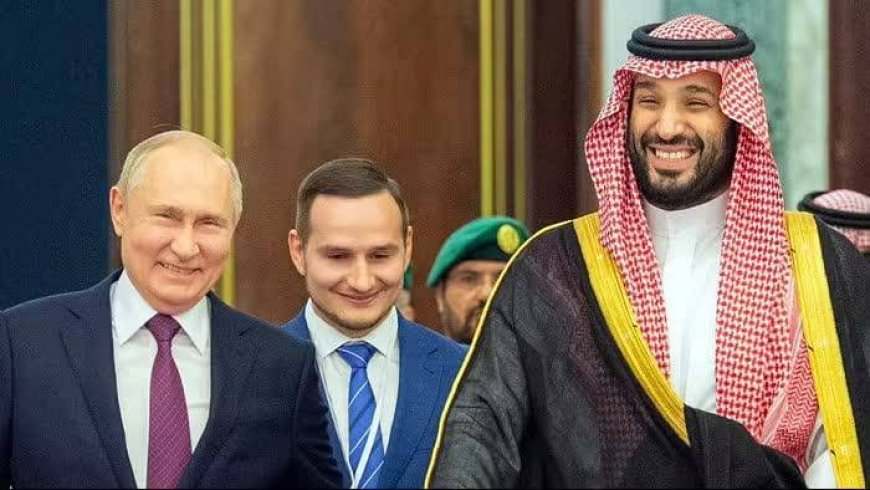Putin's Diplomatic Triumph: A Bold Step towards Reasserting Russia's Global Influence
President Vladimir Putin's recent visit to the United Arab Emirates and the Kingdom of Saudi Arabia marked a significant turning point for Russia's international standing amidst the ongoing conflict in Ukraine. Prior to this, he had embarked on diplomatic missions to China, Iran, and various former Soviet nations. However, this particular journey held exceptional importance for both Russia and the host countries, Saudi Arabia and the UAE. The warm reception Putin received from Mohammed bin Zayed far exceeded expectations, with the latter even referring to the Russian president as his dear friend. Following this gracious welcome, Putin proceeded to Saudi Arabia, where he engaged in discussions with the Saudi Crown Prince, Mohammed bin Salman (also known by his initials, MBS).

This landmark tour, viewed through several lenses, underscores the profound significance it holds. Foremost, it serves as Moscow’s explicit message to the West that Russia is no longer isolated and that the United States' strategic partners in the Middle East wholeheartedly embrace Putin's presence. This resounding message dismantles the notion that the West's policy of isolating the Kremlin has succeeded, instead revealing Russia's ability to reestablish its agency within the international system.
Moreover, this diplomatic endeavor unfolded amidst the Israel-Palestine conflict in Gaza, adding further weight to its significance. One of the key items on the agenda was how to put an end to Israeli aggression. Criticizing American diplomacy in this conflict, Putin attributed the war to Washington’s self-interest and arbitrary approach to the Palestinian question. Putin's reference to the Middle East Quartet, an effort involving Russia, the United States, the European Union, and the United Nations to address the Palestinian issue, suggests his comprehension of anxieties regarding the regional escalation of the conflict.
Given his close ties with Iran, it is plausible that Putin may exert pressure on Iran to calm the hostilities. In fact, Russia has positioned itself as a mediator in resolving this issue, with Putin asserting that his strong relationships with the conflicting parties enable him to construct a successful agenda and bring about an end to the Gaza conflict. However, Putin emphasized that this can only materialize through the cooperation of regional powers, highlighting the distinction between Russia's approach and that of the United States. In fact, Russia seems poised to present itself as a benevolent player in resolving this conflict, leveraging its political tools to address global crises.
Another crucial aspect of this trip for Russia was securing the UAE's role in Moscow’s bypassing Western sanctions and facilitating currency transactions, as Putin is well aware that the UAE's involvement in the Western sanctions regime could pose significant challenges for Russia’s economy. Consequently, Putin expressed appreciation for the UAE's financial services, which could be interpreted as a form of neutrality.
Equally significant was Putin's meeting with the Saudi Crown Prince. Saudi Arabia, being the largest oil producer and exporter, wields considerable influence over the pricing of this vital commodity. As members of OPEC+, both Russia and Saudi Arabia seek to curtail oil production, a matter both Putin and MBS emphasized. This shared perspective predominantly stems from their respective interests. Russia requires high oil prices to finance the needs of the war in Ukraine and exert pressure on Biden and EU nations, while Saudi Arabia aims to sell oil at elevated prices to fund its ambitious projects.
Lastly, one must acknowledge Putin's endeavor to assuage Arab concerns regarding the close ties between Moscow and Tehran. Recognizing the apprehensions Arab nations harbor towards Iran's growing influence in the Middle East, Putin contends that Iran's intentions do not seek to destabilize the region. According to him, Iran's modern weaponry serves to counter the United States rather than neighboring countries. By addressing these security concerns, Putin aims to prevent an expansion of American hegemony in the region—an outcome that would not bode well for Russia and the Middle East at large.
With his confidence restored, Putin now embarks on further international ventures, with India and Turkey likely to be his next destinations. These forthcoming visits send a resolute message to the West: Russia stands united and resolute, no longer isolated in its pursuit of global influence.













































